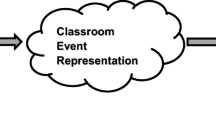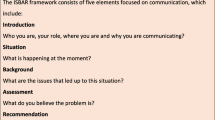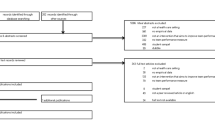Abstract
Residents must develop knowledge, skills, and attitudes to handle a rapidly developing clinical environment. To address this need, adaptive expertise has been suggested as an important framework for health professions education. However, research has yet to explore the relationship between workplace learning and adaptive expertise. This study sought to investigate how clinical supervision might support the development of adaptive expertise. The present study used a focused ethnography in two emergency departments. We observed 75 supervising situations with the 27 residents resulting in 116 pages of field notes. The majority of supervision was provided by senior physicians, but also included other healthcare professionals. We found that supervision could serve two purposes: closure and discovery. Supervision aimed at discovery included practices that reflected instructional approaches said to promote adaptive expertise, such as productive struggle. Supervision aimed at closure-included practices with instructional approaches deemed important for efficient and safe patient care, such as verifying information. Our results suggest that supervision is a shared practice and responsibility. We argue that setting and aligning expectations before engaging in supervision is important. Furthermore, results demonstrated that supervision was a dynamic process, shifting between both orientations, and that supervision aimed at discovery could be an an appropriate mode of supervision, even in the most demanding clinical situations.
Similar content being viewed by others
References
Andreassen, P., Christensen, M. K., & Møller, J. E. (2019). Focused ethnography as an approach in medical education research. Medical Education, 54(4), 296–302. https://doi.org/10.1111/medu.14045
Bereiter, C., & Scardamalia, M. (1993). Surpassing ourselves, an inquiry into the nature and implications of expertise. Open Court Publishng Company.
Bransford, J. D., & Schwartz, D. L. (1999). Rethinking transfar: A simple proposal with multiple implications. In A. Iran-Nejad & P. D. Pearson (Eds.), Review of research in education (pp. 61–100). American Educational Association (AERA).
Coren, S., & Farber, B. A. (2019). A qualitative investigation of the nature of “informal supervision” among therapists in training. Psychotherapy Research, 29(5), 679–690. https://doi.org/10.1080/10503307.2017.1408974
Crawford, V. M., Schlager, M., Toyama, Y., Riel, M. & Vahey, P. (2005). Characterizing adaptive expertise in science teaching. Paper presented at the American Educational Research Association, Montreal, Canada.
Croskerry, P. (2012). Perspectives on diagnostic failure and patient safety. Healthcare Quarterly (Toronto, Ont.), 15 (Special Issue).
Cutrer, W. B., Miller, B., Martin, V., Mejicano, G., Mangrulkar, R. S., et al. (2017). Fostering the development of master adaptive learners: A conceptual model to guide skill acquisition. Academic Medicine, 92(1), 70–75. https://doi.org/10.1097/ACM.0000000000001323
Eva, K. W., & Regehr, G. (2007). Knowing when to look it up: A new conception of self-assessment ability. Academic Medicine, 82, S81–S84.
Farnan, J. M., Petty, L. A., Georgitis, E., Martin, S., Chiu, E., et al. (2012). A systematic review: The effect of clinical supervision on patient and residency education outcomes. Academic Medicine, 87(4), 428–442.
Fischer, M. A., Mazor, K. M., Baril, J., Alper, E., DeMarco, D., et al. (2006). Learning from mistakes. Journal of General Internal Medicine, 21, 419–423.
Hatano, G. (1982). Cognitive consequences of practice in culture specific procedural skills. The Quarterly Newsletter of the Laboratory of Comparative Human Cognition, 4(1), 14–17.
Hatano, G., & Inagaki, K. (1986). Two courses of expertise. In H. Stevenson, H. Azuma, & K. Hakuta (Eds.), Child development and education in Japan (pp. 27–36). WH Freeman.
Hauer, K. E., ten Cate, O., Boscardin, C., Irby, D. M., Iobst, W., et al. (2014). Understanding trust as an essential element of trainee supervision and learning in the workplace. Advances in Health Sciences Education, 19, 435–456. https://doi.org/10.1007/s10459-013-9474-4
Hughes, C. (2004). The supervisor’s influence on workplace learning. Studies in Continuing Education, 26(2), 275–287. https://doi.org/10.1080/158037042000225254
Hutchins, E. (2010). Cognitive ecology. Topics in cognitive. Science, 2, 705–715. https://doi.org/10.1111/j.1756-8765.2010.01089.x
Jansen, I., Stalmeijer, R. E., Silkens, M. E. W. M., & Lombarts, K. M. J. M. H. (2020). An act of performance: Exploring residents’ decision-making processes to seek help. Medical Education, 55, 758–767. https://doi.org/10.1111/medu.14465
Klasen, J. M., & Lingard, L. (2019). Allowing failure for educational purposes in postgraduate clinical training: A narrative review. Medical Teacher, 41(11), 1263–1269. https://doi.org/10.1080/0142159X.2019.1630728
Klasen, J. M., Teunissen, P. W., Driessen, E. W., & Lingard, L. (2022). ‘It depends’: The complexity of allowing residents to fail from the perspective of clinical supervisors. Medical Teacher, 44(2), 196–205. https://doi.org/10.1080/0142159X.2021.1984408
Kua, J., Lim, W.-S., Teo, W., & Edwards, R. A. (2021). A Scoping review of adaptive expertise in education. Medical Teacher, 43(3), 347–355.
Lockspeiser, T. M., Li, S.-T.T., Burke, A. E., Rosenberg, A. A., Dunbar, A. E., et al. (2016). Pursuit of meaningful use of learning goals in residency: A qualitative study of pediatric residents. Academic Medicine, 91(6), 839–846. https://doi.org/10.1097/ACM.0000000000001015
Moulton, C.-A.E., Regehr, G., Mylopoulos, M., & MacRae, H. M. (2007). Slowing down when you should: A new model of expert judgement. Academic Medicine, 82(10), S109-116.
Mylopoulos, M., Brydges, R., Woods, N. N., Manzone, J., & Schwartz, D. L. (2016). Preparation for future learning: A missing competency in health professions education? Medical Education, 60, 115–123.
Mylopoulos, M., & Farhat, W. (2015). ‘“I can do better”’: Exploring purposeful improvement in daily clinical work. Advances in Health Sciences Education, 20, 371–383.
Mylopoulos, M., Kulasegaram, K., & Woods, N. N. (2018). Developing the experts we need: Fostering adaptive expertise through education. Journal of Evaluation in Clinical Practice, 24, 674–677.
Mylopoulos, M., Lohfeld, L., Norman, G. R., Dhaliwal, G., & Eva, K. (2012). Renowned physicians’ perceptions of expert diagnostic practice. Academic Medicine, 87(10), 1413–1417.
Mylopoulos, M., & Regehr, G. (2007). Cognitive metaphors of expertise and knowledge: Prospects and limitations for medical education. Medical Education, 41, 1159–1165. https://doi.org/10.1111/j.1365-2923.2007.02912.x
Mylopoulos, M., & Woods, N. N. (2009). Having our cake and eating it too: Seeking the best of both worlds in expertise research. Medical Education, 43, 406–413.
Mylopoulos, M., & Woods, N. N. (2017). When I say… adaptive expertise. Medical Education, 51, 685–686.
Rashid, M., Hodgson, C. S., & Luig, T. (2019). Ten tips for conducting focused ethnography in medical education research. Medical Education, 24, 1624133. https://doi.org/10.1080/10872981.2019.1624133
Reeves, S., Peller, J., Goldman, J., & Kitto, S. (2013). Ethnography in qualitative educational research: AMEE guide no. 80. Medical Teacher, 35(8), e1365–e1379. https://doi.org/10.3109/0142159X.2013.804977
Rothwell, C., Kehoe, A., Farook, S. & Illing, J. (2019). The characteristics of effective clinical and peer supervision in the workplace: a rapid evidence review. https://www.hcpc-uk.org/globalassets/resources/reports/research/effective-clinical-and-peer-supervision-report.pdf?v=637147781260000000: Newcastle University. Available at: https://www.hcpc-uk.org/globalassets/resources/reports/research/effective-clinical-and-peer-supervision-report.pdf?v=637147781260000000.
Schwartz, D. L., Bransford, J. D., & Sears, D. (2005). Efficiency and innovation in transfer. In J. P. Mestre (Ed.), Transfer of learning from a modern multidisciplinary perspective (pp. 1–51). Information Age Publishing.
Sehlbach, C., Teunissen, P. W., Driessen, E. W., Mitchell, S., Rohde, G. G. U., et al. (2020). Learning in the workplace: Use of informal feedback cues in doctor-patient communication. Medical Education, 54(9), 811–820. https://doi.org/10.1111/medu.14148
Sockalingam, S., Rajaratnam, T., Zhou, C., Serhal, E., Crawford, A., et al. (2021). Building mental health capacity: exploring the role of adaptive expertise in the ECHO virtual learning model. JCEHP, 41(2), 104–110.
Spradley, J. P. (1980). Participant observation. Holt, Rinehart and Winstron Inc.
Steenhof, N., Woods, N. N., Van Gerven, P., & Mylopoulos, M. (2019). Productive failure as an instructional approach to promote future learning. Advances in Health Sciences Education, 24, 739–749.
ten Cate, O., Carraccio, C., Damodaran, A., Gofton, W., Hamstra, S. J., et al. (2021). Entrustment decision making: Extending Miller’s pyramid. Academic Medicine, 96(2), 199–204.
Teunissen, P. W., Scheele, F., Scherpbier, A. J. J. A., Van Der Vleuten, C. P. M., Boor, K., et al. (2007). How residents learn: Qualitative evidence for the pivotal role of clinical activities. Medical Education, 41(8), 763–770. https://doi.org/10.1111/j.1365-2923.2007.02778.x
Varpio, L., Paradis, E., Uijdehaage, S., & Young, M. (2020). The distinctions between theory, theoretical framework, and conceptual framework. Academic Medicine, 95(7), 989–994. https://doi.org/10.1097/ACM.0000000000003075
Wineburg, S. (1998). Reading Abraham Lincoln: An expert/expert study in interpretation of historical texts. Cognitive Science, 22(3), 319–346.
Woods, N., & Mylopoulos, M. (2015). On clinical reasoning research and applications: Redefining expertise. Medical Education, 49, 542–544.
Acknowledgements
We wish to extend our gratitude to the Emergency Departments at Aarhus University Hospital Denmark and Horsens Regional Hospital for their help in providing the opportunity to collect data – both in general but also under the extraordinary circumstances which have affected their clinical context during some parts of data collection.
Funding
Financial support for this study was provided by two grants from the Health Sciences Research Fund of Central Denmark Region. The funding agreement ensured the authors’ independence in designing the study, interpreting the data, writing, and publishing the report.
Author information
Authors and Affiliations
Corresponding author
Ethics declarations
Ethical approval
Was obtained from The Central Denmark Region Committees on Health Research Ethics (J.nr.: 1-10-72-1-19), and the Danish Data Protection Agency (J.nr.: 2016-051-000001).
Additional information
Publisher's Note
Springer Nature remains neutral with regard to jurisdictional claims in published maps and institutional affiliations.
Rights and permissions
Springer Nature or its licensor (e.g. a society or other partner) holds exclusive rights to this article under a publishing agreement with the author(s) or other rightsholder(s); author self-archiving of the accepted manuscript version of this article is solely governed by the terms of such publishing agreement and applicable law.
About this article
Cite this article
Gamborg, M.L., Jensen, R.D., Musaeus, P. et al. Balancing closure and discovery: adaptive expertise in the workplace. Adv in Health Sci Educ 27, 1317–1330 (2022). https://doi.org/10.1007/s10459-022-10177-9
Received:
Accepted:
Published:
Issue Date:
DOI: https://doi.org/10.1007/s10459-022-10177-9




